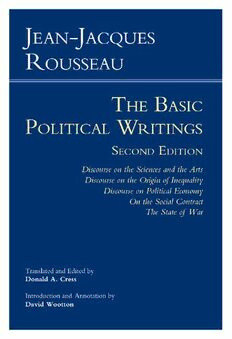Table Of ContentJEAN-JACQUES
ROUSSEAU
THE BASIC
POLITICAL WRITINGS
SECOND EDITION
Discourse on the Sciences and the Arts
| DTT La OU he er LLY
Discourse on Political Economy
On the Social Contract
The State of War
Translated and Edited by
Donald A. Cress
Introduction and Annotation by
David Wootton
Rousseau
BASIC POLITICAL WRITINGS
Second Fdition
Jean-Jacques Rousseau
BASIC POLITICAL WRITINGS
Second Edition
Discourse on the Sciences and the Arts
Discourse on the Origin and Foundations of Inequality among Men
Discourse on Political Economy
On the Social Contract
The State of War
Translated and Edited by
Donald A. Cress
Introduction and New Annotation by
David Wootton
Hackett Publishing Company, Inc.
Indianapolis / Cambridge
Copyright © 2011 by Hackett Publishing Company, Inc.
All rights reserved
Printed in the United States of America
IS 14 13 12 11 1234567
For further information, please address:
Hackett Publishing Company, Inc.
P.O. Box 44937
Indianapolis, IN 46244-0937
www.hackettpublishing.com
Cover design by Listenberger & Associates
Text design by Meera Dash
Composition by William Hartman
Printed at Victor Graphics, Inc.
Library of Congress Cataloging-in-Publication Data
Rousseau, Jean-Jacques, 1712-1778.
[Selections. English. 2011]
Basic political writings / Jean-Jacques Rousseau ; translated
and edited by Donald A. Cress ; introduction and new annotation
by David Wootton. — 2nd ed.
p. cm.
Includes bibliographical references and index.
ISBN 978-1-60384-673-8 (pbk.) — ISBN 978-1-60384-674-5 (cloth)
1. Political science. L. Cress, Donald A. II. Title.
JC179.R7 2011
320.01—de23 2011025946
Adobe PDF ebook ISBN: 978-1-60384-861-9
Contents
Translator’s Note vii
Introduction ix
Suggestions for Further Reading XXXV
Chronology XXxvi
Discourse on the Sciences and the Arts
Discourse on the Origin and Foundations of Inequality among Men 27
Rousseau’s Notes to Discourse on the Origin and Foundations of
Inequality among Men 93
Discourse on Political Economy 121
On the Social Contract 153
Book I 156
Book IT 170
Book III 191
Book IV 224
The State of War 253
Index 266
Translator’s Note
With the exception of The State of War—my translation of which is new to
this edition, and whose textual basis is given in the headnote to that work—
the translations contained in this volume are based on the excellent Oeuvres
Completes de Jean-Jacques Rousseau, Volume 3 (Paris: Pleiade, 1964). My trans-
lations of the Discourse on the Sciences and the Arts, Discourse on the Origin and
Foundations of Inequality among Men, Discourse on Political Economy, and On
the Social Contract—earlier versions of which appeared in the first edition
of Jean-Jacques Rousseau: The Basic Political Writings—have been revised in
light of generous and invaluable suggestions offered by David Wootton, all of
which I have considered with enormous gratitude and most of which I have
adopted. Any errors or infelicities that remain are my own.
Square brackets [ | enclose editorial annotations, most of which were pro-
vided for this edition by David Wootton; square-bracketed items embedded
in the text typically provide the term translated by the rendering that imme-
diately precedes the bracketed item, but occasionally they offer a clarifying
editorial comment. In the Discourse on the Origin and Foundations of Inequality
among Men, angle brackets < > enclose passages added or revised by Rousseau
in the 1782 edition.
D.A.C.
vii
Introduction
“We are approaching the state of crisis and the century of revolutions.” !
—The tutor in Rousseau’s novel Emile (1762)
Jean-Jacques Rousseau (1712-1778) is a great political theorist, but he is read
for the wrong reasons. Three social contract theorists, Thomas Hobbes, John
Locke, and Rousseau, are at the center of any introduction to political theory:
Hobbes, for his intellectual rigor; Locke, because he is the theorist of the
American Revolution; and Rousseau, because he is the theorist of the French
Revolution. Locke may or may not have been an important theorist for the
American Founding Fathers—the matter is much debated. Rousseau was not
regarded as an important political theorist prior to the French Revolution of
1789; his major work of political theory, On the Social Contract, was published
in French in 1762, but not translated into English until 1791, and his books
were not a cause of the revolution. Robespierre and the Jacobins admired him
greatly, but they misunderstood him profoundly (their Rousseau was invented
to serve their own purposes). It is scarcely worth reading Rousseau if we want
to understand eighteenth-century politics, either before or after 1789, but it
is certainly worth reading his works if we want to understand ourselves and
our own politics. For Rousseau’s importance lies, as he always insisted, in his
remarkable understanding of the nature of human beings. He, more than
any other political theorist, has something important to say about who we
are and what politics is for.
In order to understand Rousseau we need to bear three things in mind.
First, Rousseau is always writing about Jean-Jacques. The first word of his
Soctal Contract is “1”; the last word is “me.” In order to understand Hobbes
or Locke, it helps to know something about seventeenth-century politics,
but one need not know much about their lives. It really does not matter that
Hobbes was employed as a tutor, or Locke as a doctor. Rousseau is different.
Everything he writes—and not just his Confessions or Rousseau, Fudge of Jean-
jacques—comes directly out of a meditation on his own experience of life and
is consequently about himself. Not entirely surprisingly, he was the author
of a play, Narcissus, or the Man Who Fell in Love with Himself (1752). Who is
Rousseau? When he writes about politics he consistently describes himself as
“Citizen of Geneva.”? To understand his politics, we will need to start with
his relationship to Geneva.
* Jean-Jacques Rousseau, Emile, or On Education, trans. Allan Bloom (New York: Basic Books,
1979), 194.
* “Citizen of Geneva,” title pages of first and second Discourses and Social Contract, below,
pp. 3, 29, 155.
ix

